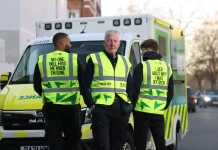Dr Paula Christie, Research and Enhancement at College Development Network, highlights the importance of implementing trauma-informed practice to help students as they enter the learning environment
As many as 240,000 children and young people in Scotland are brought up in poverty and tackling child poverty is a top priority according to the Scottish Government. More than a third of UK households are grappling with fuel and food poverty as the consumer price index increased 9.2% year-on-year for December 2022.
Scotland-based CDN is channelling time, energy, and resource to support colleges in mitigating the impact of poverty and trauma on the future success of college students through the work of its Research and Enhancement Centre.
Tackling poverty and inequality within education
Poverty is not a new subject for colleges in Scotland – for many years a significant proportion of the college student population has traditionally come from the lowest socio-economic backgrounds. In 2022, 34% of college students were from the 20% most deprived postcodes in Scotland.
Colleges play a crucial role in tackling poverty and inequality and in driving a more inclusive economy. This is the theme of the third of the CDN Research and Enhancement Centre’s ‘Pathways from Poverty’ reports. Trauma-informed practice is an approach grounded in the understanding that exposure to trauma can impact an individual’s neurological, biological, psychological and social development.
Through an in-depth study of the approach taken by West Lothian College to addressing the challenges faced by its learners, their families and their community, we were able to examine the role and impact of a college in post-pandemic Scotland.
The trauma-informed approach to learning at West Lothian College is being built upon and disseminated through the sector by CDN, whose remit includes supporting skills and development across the sector, sharing of best practice, and promoting college as an educational destination of choice.
A ‘whole college’ approach to trauma-informed practice
The ‘whole college’ approach to trauma-informed practice was an apt strategic response to the challenges faced by learners and, importantly, by staff as well. An understanding of adverse childhood experiences and their impact, mental health training, and the use of resources such as NHS Scotland trauma training have been developed into a college-wide trauma-informed approach which has been encapsulated in the institution’s goal of ‘leading with vision and empathy’. Along with key staff many learners have also had the opportunity to undertake mental health training.
The success of the trauma-informed approach being adopted college-wide is evident and has evolved from West Lothian College’s goals developed and established during the Covid-19 pandemic. West Lothian College Principal Jackie Galbraith noted that the goals set inspired success for all, supporting economic recovery and growth, strengthening communities and leading with vision and empathy. Most importantly, all staff working across the College were able to align and identify with these goals.
Colleges have indirectly always focused on poverty, inequality, and inclusion. Scotland’s colleges have long offered a route to connect people to the skills and experience needed to take on new opportunities to study and to work. Without this role as a driver of educational and career progression, fewer people from more deprived backgrounds would have the support and chance to gain the qualifications that can be a passport to better work and greater well-being.
The socioeconomic and psychosomatic impact of COVID-19
March 2023 marks the three-year inauspicious anniversary of the Covid-19 pandemic that changed our lives forever. What started as a health crisis has had a lasting impact on several walks of life. The socioeconomic and psychosomatic impact of the pandemic on students has further exacerbated the trauma on learners, not just secondary school students making the transition to college, but students across all age groups.
Creating a safe space for learners to develop is, hence, more important than ever before. The ground realities faced by students coming from poverty-stricken backgrounds are complex. A whole-system approach that factors in all stakeholders is pivotal to overcoming these complexities.
By establishing an environment in which vulnerable learners can prosper, colleges are breaking down barriers to education and widening participation, often with the benefits extending beyond the learners and into the wider community.
TRUST: Trauma Responsive Unique Support Tailor-made Project
The West Lothian College formulated The TRUST (Trauma Responsive Unique Support Tailor-made) Project, which served as a wraparound service to support students who experienced trauma in their lives. TRUST gave rise to The Den – a dedicated safe space that gives learners the benefit of a personalised, bespoke, and tailored approach to learning with trained specialist staff.The TRUST Project has succeeded in helping the college realise its true potential of fostering a people-centric space to the individual learner. The Den might seem like a simple solution but the careful strategic thought behind every aspect within the space has helped young people and adults. The trauma-informed approach is an important step in steering away from a crisis. Along with the educators in colleges, the onus is on support staff, parents, and other key stakeholders to help unlock the true potential across Scotland’s schools and colleges.
In 2022, the unemployment rate in the UK was 3.7%, and 1.24 million people aged 16+ were unemployed. Unemployment levels increased in the last quarter but had fallen over 2021. Stakeholders in the education sector hold the key in reducing unemployment numbers in the UK. Our colleges have the potential to become key cogs in filling high-demand skills shortages in the country.
Trauma-informed practice and bridging gaps
To successfully bridge this gap, it is imperative that trauma-informed practice in colleges, and to a large extent, secondary schools, should be made the norm. A whole college and trauma-informed approach, as adopted by West Lothian College, has had a real and positive impact for learners, staff, and external support services. This has created new opportunities for those who may have otherwise been estranged from education and access to further skills and self-development.
Find out more by reading the CDN Research and Enhancement Centre’s Pathways from Poverty series of reports.











